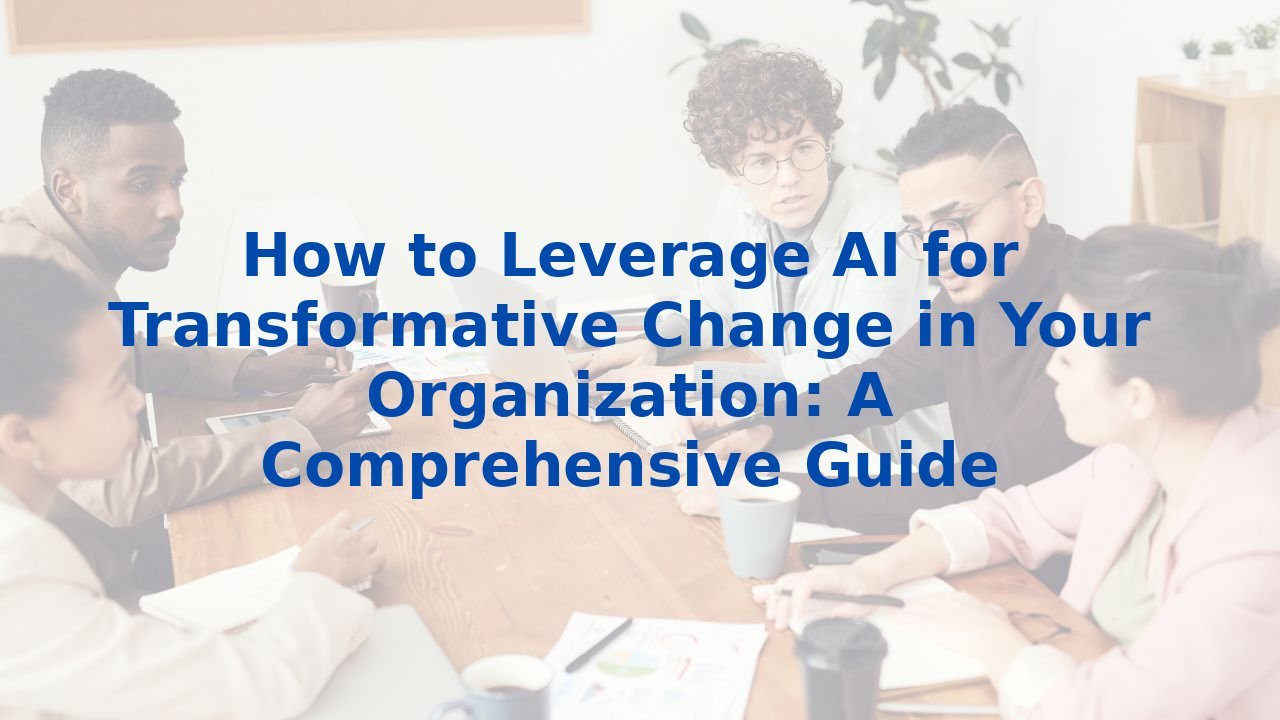How to Leverage AI for Transformative Change in Your Organization: A Comprehensive Guide
How to Leverage AI for Transformative Change in Your Organization: A Comprehensive Guide
In the modern landscape of business, every organization aspires to not just survive but thrive. With the undeniable advancements in technology, Artificial Intelligence (AI) has emerged as a game changer. It is not merely a tool but a transformative force that can redefine the essence of your business operations. This guide explores how to effectively leverage AI for transformative change while emphasizing the profound benefits it brings to efficiency within your organization.
Understanding Business Processes and AI Enhancement
The journey toward AI integration begins with a thorough understanding of your existing business processes. Identifying how AI can enhance these operations is key to unlocking its full potential. Here are several crucial processes that can be significantly improved through AI.
1. Process Discovery and Mapping
Before any transformation can take place, it is vital to first understand what processes are currently in place. AI shines in this area through process mining. By analyzing data from various source systems, AI can reveal patterns within your workflows. This visualization provides clarity, allowing teams to identify inefficiencies and optimize operational models. The importance of mapping cannot be understated—it forms the foundation of implementing any strategic AI initiative.
2. Process Automation
Consider the mundane tasks that consume your team's time. AI can automate these manual activities, freeing your employees to engage in more creative and strategic pursuits. This not only reduces human error but also leads to a notable increase in productivity. For instance, scheduling meetings or managing inventory can easily be delegated to AI bots, allowing human talent to focus on innovation and problem-solving.
3. Real-Time Monitoring and Optimization
In a world where speed and efficiency are paramount, AI's capability to monitor processes in real-time provides a competitive edge. By keeping tabs on operations as they unfold, organizations can quickly address issues and seize emerging opportunities. AI’s predictive capabilities enable proactive measures, which means potential bottlenecks can be identified and resolved before they disrupt workflow.
4. Decision-Making and Predictive Analytics
A vital component of successful businesses is making informed decisions quickly. AI empowers organizations by offering extensive data analysis and the ability to simulate various scenarios. This results in clearer insights that guide decision-making processes. With the support of AI’s predictive analytics, leaders can navigate complexities and recognize patterns that lead to informed choices. Armed with this knowledge, businesses can pivot and adapt to changes swiftly.
5. Continuous Improvement
Employing AI is not a one-time shift but a commitment to continuous improvement. AI provides ongoing feedback and actionable recommendations that drive innovation while ensuring your organization remains competitive. This iterative approach allows companies to remain flexible, recognizing that change is not just beneficial but essential for long-term success.
The Multifaceted Benefits of AI Integration
The integration of AI offers multiple advantages that extend beyond mere convenience:
- Improved Efficiency: Automation reduces the burden of repetitive tasks, leading to significant time savings.
- Enhanced Decision-Making: With data-driven insights, decisions become more strategic and informed.
- Optimized Processes: AI identifies inefficiencies, enabling targeted improvements.
- Real-Time Monitoring: Instant feedback mechanisms support prompt interventions.
- Cost Reduction: Automation and efficiency lead to lower operational costs.
The Essential Role of Employee Training
While AI is a robust tool, its true potential is unlocked when the human element is integrated effectively. Training your workforce to harness AI can greatly enhance the transformative impact it has on your organization. Here’s why investing in AI training is essential:
- Understanding AI Capabilities: Employees need insight into how AI functions to integrate it seamlessly into their tasks.
- Data Analysis Skills: Basic proficiency in data interpretation empowers employees to leverage AI insights.
- Adaptability: A workforce that adjusts to new technology is critical for a smooth transition to AI-driven processes.
- Continuous Learning: Regular training ensures that staff remains conversant with the evolving landscape of AI tools and techniques.
Conclusion
AI represents more than just technological advancement; it is a transformative force capable of redefining business operations. By focusing on critical processes such as discovery, automation, real-time monitoring, decision-making, and continuous improvement, organizations can significantly enhance their operational efficiency. Simultaneously, investing in employee training will cultivate a workforce prepared to fully realize the benefits of AI integration. In doing so, companies will not only adapt to change but thrive in an ever-evolving digital landscape. The question is not whether to embrace AI, but how far you will take it.
Embrace the future with AI, harness the potential of your workforce, and watch your organization transform.
For organizations eager to embark on this transformative journey, consider exploring comprehensive training solutions that equip your workforce with vital AI skills.



